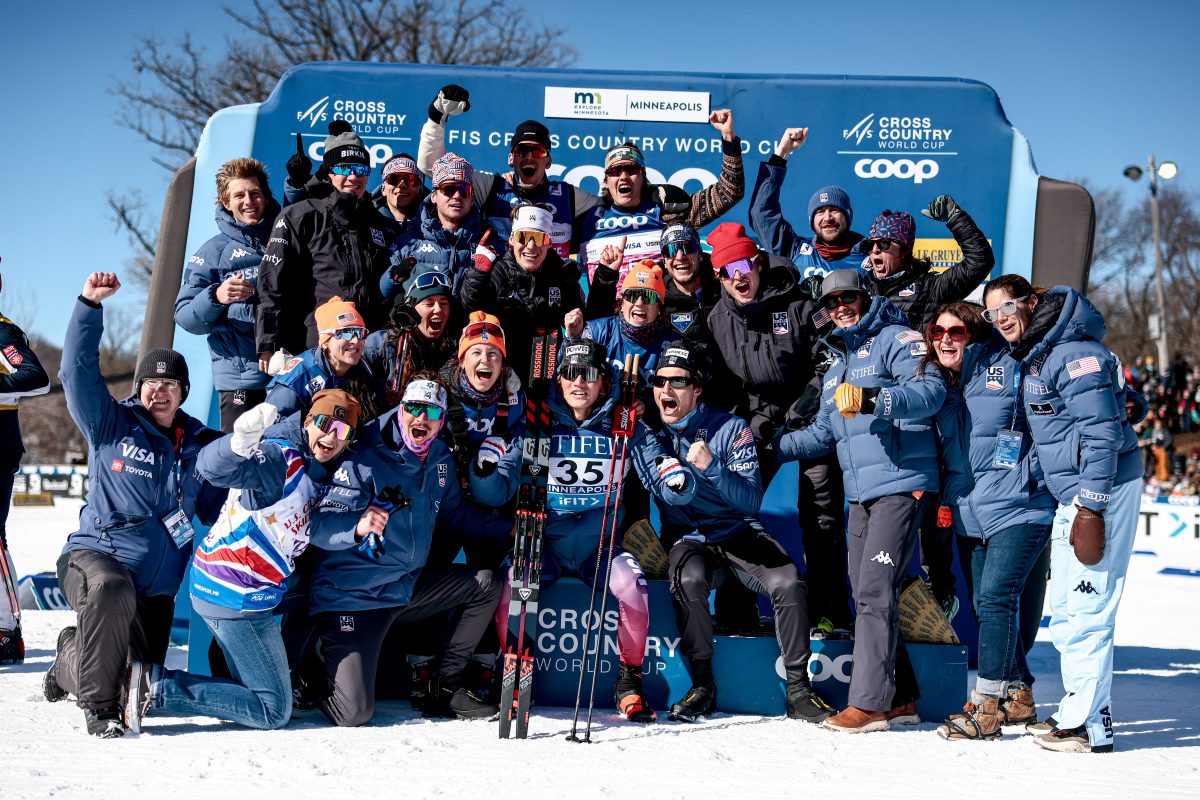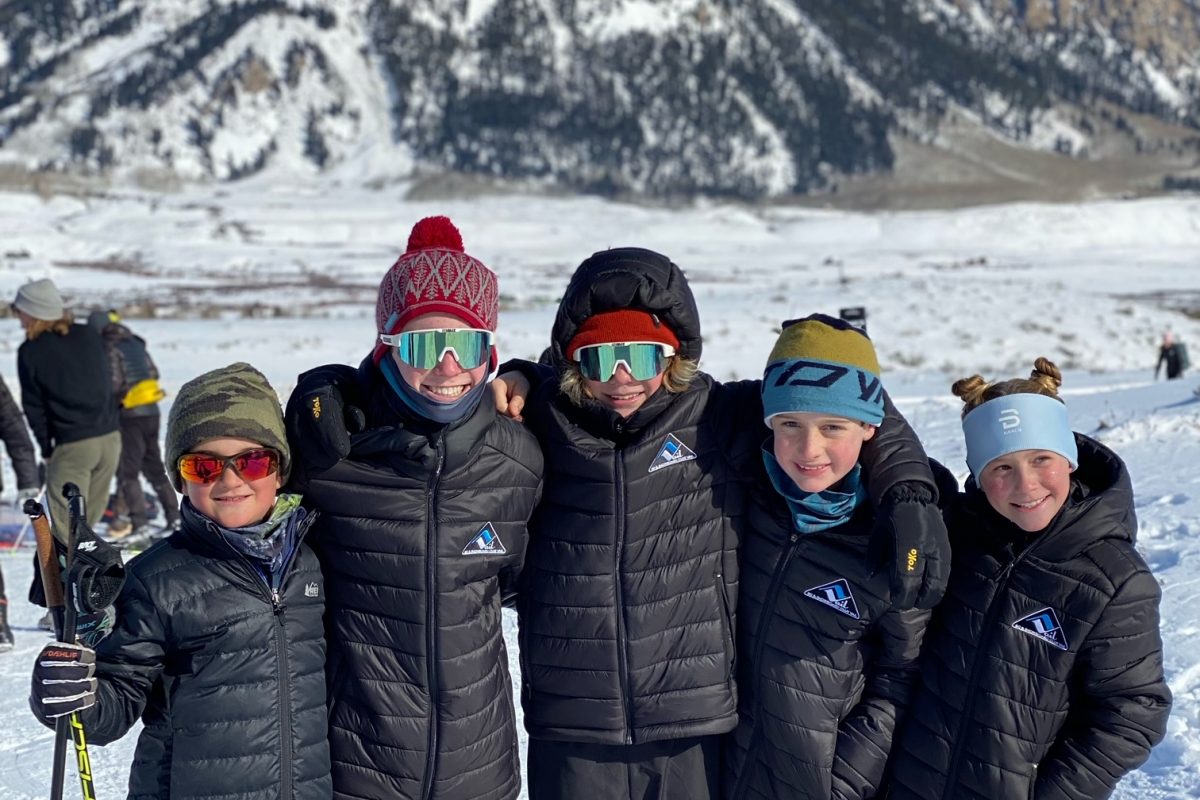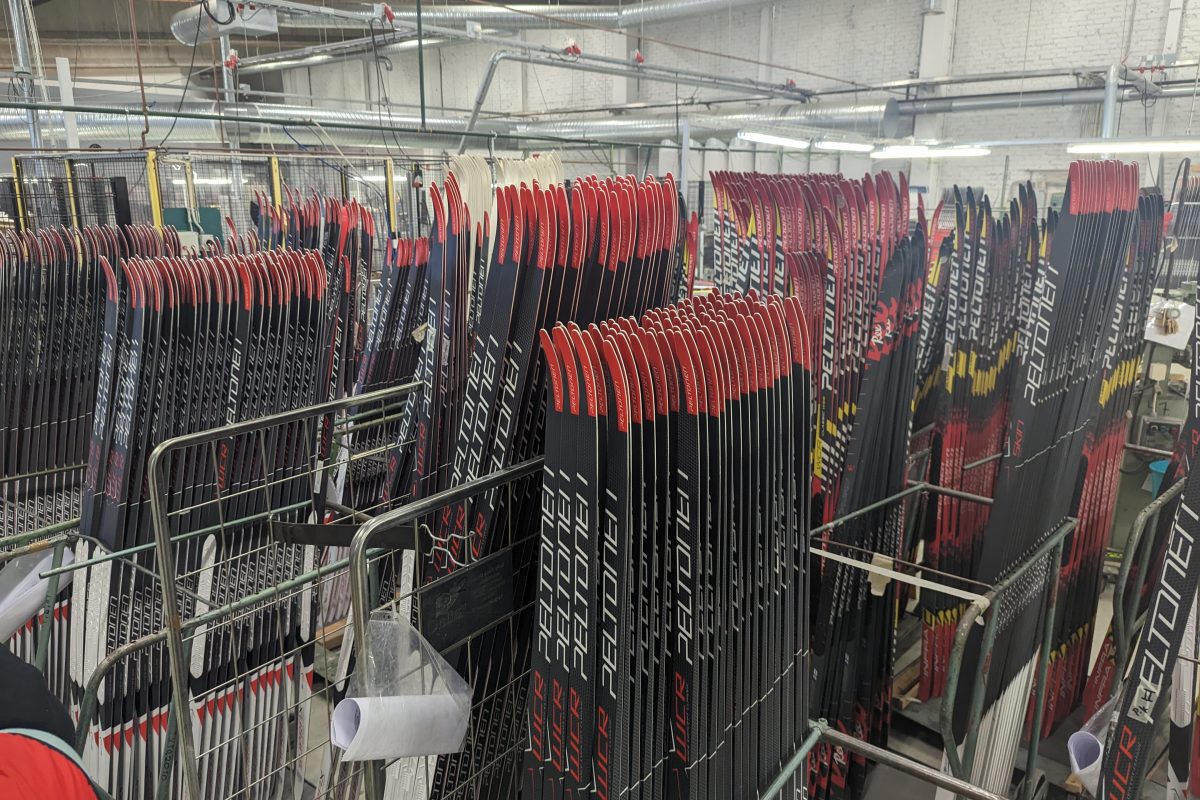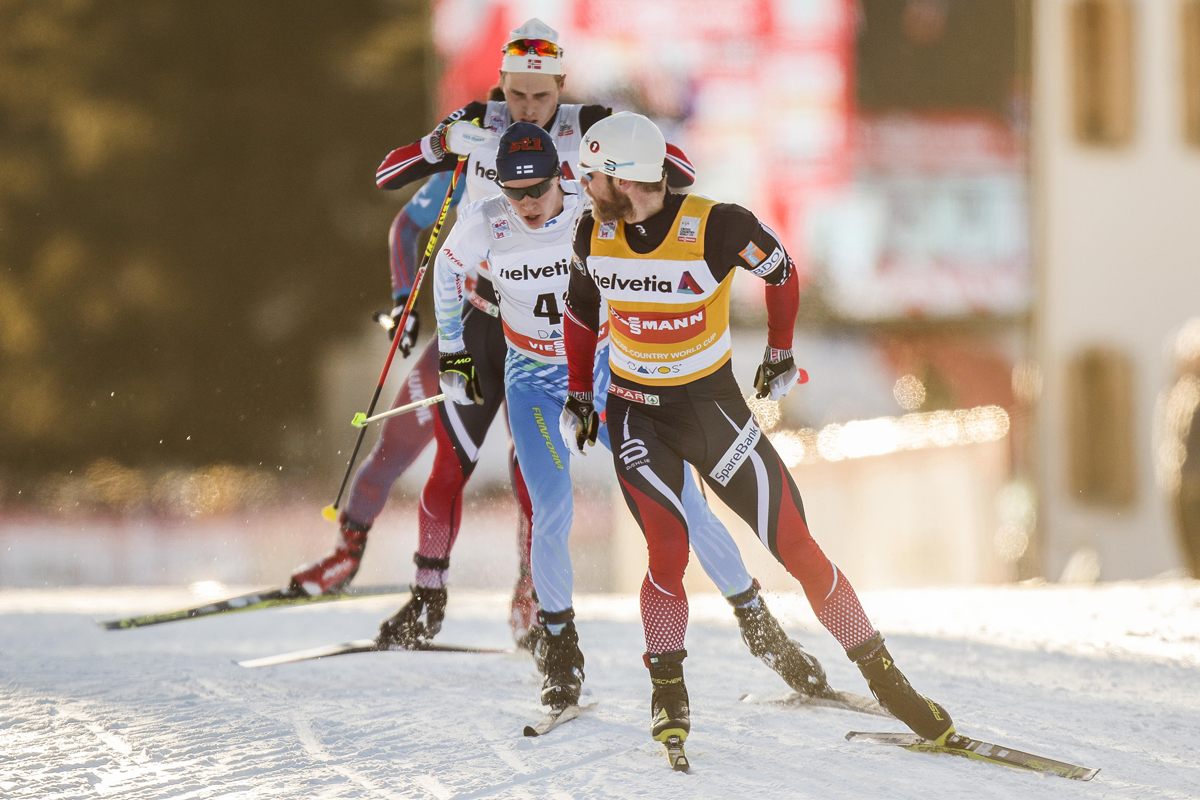
DAVOS, Switzerland — Martin Johnsrud Sundby might not have had the fastest World Cup opener (by his standards), but two weeks later it’s clear who is king of the distance field: the same Norwegian who won the World Cup distance globe two of the last three years.
“I did not feel my best the last weekend, but I was able to catch the tour victory after all,” Sundby said of the 3-day mini-tour held in Lillehammer, Norway, last weekend. “So I knew that if I was a bit stronger this weekend I would be able to fight for the first place.”
He won, but it was a fight. After 30 kilometers and well over an hour of interval-start racing, just 13.7 seconds separated him from second-place Anders Gløersen, also from the Norwegian team.
Sundby was one of the last starters of the field – number 70 out of 78. And that was by his own choice. With a six-kilometer loop skied five times, he initially tried to game the start order so that he would be able to ski with someone fast who was lapping through. But then he settled on a different strategy.
“We did some math yesterday trying to find out which number it was good to have,” Sundby said. “I tried to get 28 numbers after Gløersen. That was not possible, so I thought it would be good to see the other intermediate times and have full control of the race. That’s helpful if you need to find the right speed.”
Despite having complete information about his top competitors, Sundby didn’t lead from start to finish. In fact, the standings fluctuated substantially, with 13 different men having top-five times at at least one of the intermediate time checks.
“It’s a strange place to do races,” Sundby mused. “You feel almost finished after two laps, and then the third lap feels great, and then you lose 10 seconds downhill, and you gain 10 seconds uphill, so the race is alive. You also have a lot of time thinking. So it’s an interesting race. I love to ski here in Davos. I’m happy about the win.”
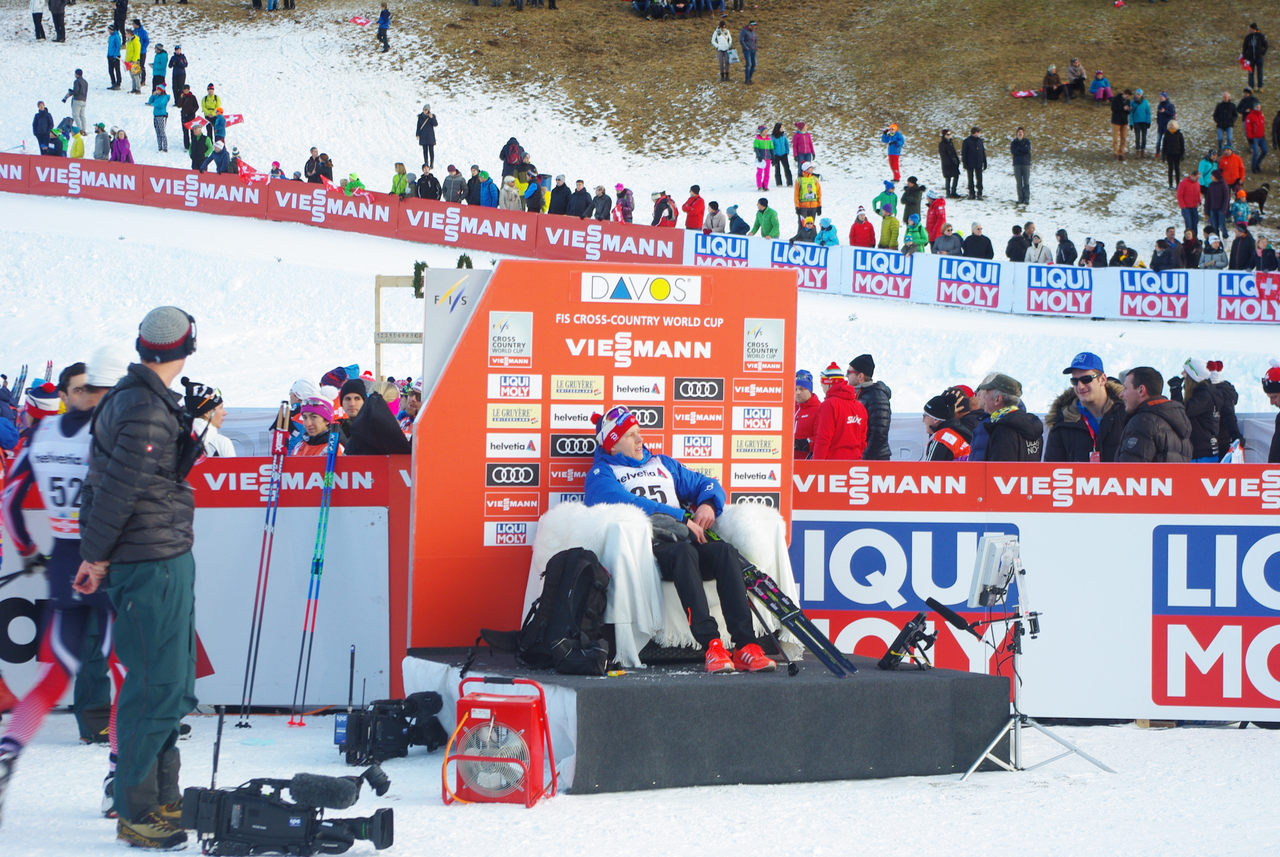
For the first almost two laps, it was Maurice Manificat of France who was laying down the fastest time.
Manificat won this race in 2013, and placed second in 2011 and 2015. But even years might be a curse for the Frenchman. After his hard start, he faltered, slipping to 11th by the finish, +1:27.8.
“Always here in Davos it’s important to try to find the right speed from the beginning and have a lot of power for the last two laps,” Sundby said in the press conference.
That could have been an admonishment for Manificat, but the Frenchman helped one man onto the podium, even if it wasn’t himself: right on his tail was Anders Gløersen of Norway, who took full advantage.
“I was lucky to have Maurice Manificat just in front of me on my second lap,” he said in the post-race press conference. “He was skiing so fast I almost died. So I see here I lost 15 seconds between 18 and 24 kilometers. I think that’s when he also felt that he also may have started too fast.”
But Gløersen was able to hold some sort of pace, even as Manificat was drifting back through the field.
“My last lap was not so bad,” he said. “I’m very satisfied with second place today.”
With so many laps, catching a ride with someone strong was the name of the game. Sundby spent some time skiing with Matti Heikkinen of Finland, who exploited their collaboration to get to third place, +25.7.
“I had the pleasure to do some laps with Matti, so that was great,” Sundby said. “Matti probably felt it was sometimes going a bit too fast. But I think we did a good race together. He was helping on his last lap. On his last lap he did a great speed down to the stadium and we were able to catch some seconds on [Gløersen], so I think we did a good job together.”
If that was a barb at the third-place Finn, Heikkinen made clear that he thought he had skied a good race, and that Sundby didn’t wear him out too much.
“My tactic was to start quite fast, but then I knew that Martin would catch me,” Heikkinen said in the press conference. “So I skied with Martin, and then the last lap I made my attack. The split times the last few kilometers, I think I was skiing quite fast.”
Indeed: his time through the 18 k checkpoint ranked just ninth, but Heikkinen dropped the hammer on his last kilometers, moving his way up through the field’s splits.
Racing together with someone else can add additional challenges, though. Especially for Gløersen, who followed the fast-starting Frenchman.
“I always like to go fast on the flats and not so fast on the steep uphills,” Gløersen said in the press conference. “That’s a challenge when you go together with people who don’t have the same pace on the flat but want to go faster on the uphills. That’s not an advantage. So you have to take into consideration what’s best for me, to go my own race, a steady pace, or to take it easy on the flats and then go on the lactate threshold on the uphills.”
Another Norwegian, Simen Andreas Sveen, took fourth, +36.3; Russia’s Alexander Legkov was fifth, +48.4, after having the second-fastest split time through the middle of the race.
Both Legkov and teammate Maxim Vylegzhanin (31st, +3:13.8) are under suspicion after the release of WADA’s newest McLaren report on Russian doping, but went through the mixed zone without taking questions from the media.
Hitching his cart to Legkov’s wagon was Andrew Musgrave of Great Britain, who powered to 15th place (+2:00.7), his third top-15 finish of the season.
“Yeah, that was lucky,” Musgrave laughed. “I wasn’t feeling amazing. I had done, like, one lap, and got caught by Legkov, and last year I learned that you can get pretty knackered if you do all the work. So I just stayed behind, didn’t do anything, and then felt alright on the last lap. So it was good. Getting pulled around by Legkov for 20 k was a bit of help, yeah.”
Harvey 12th and Killick 21st; Hoffman Lone American
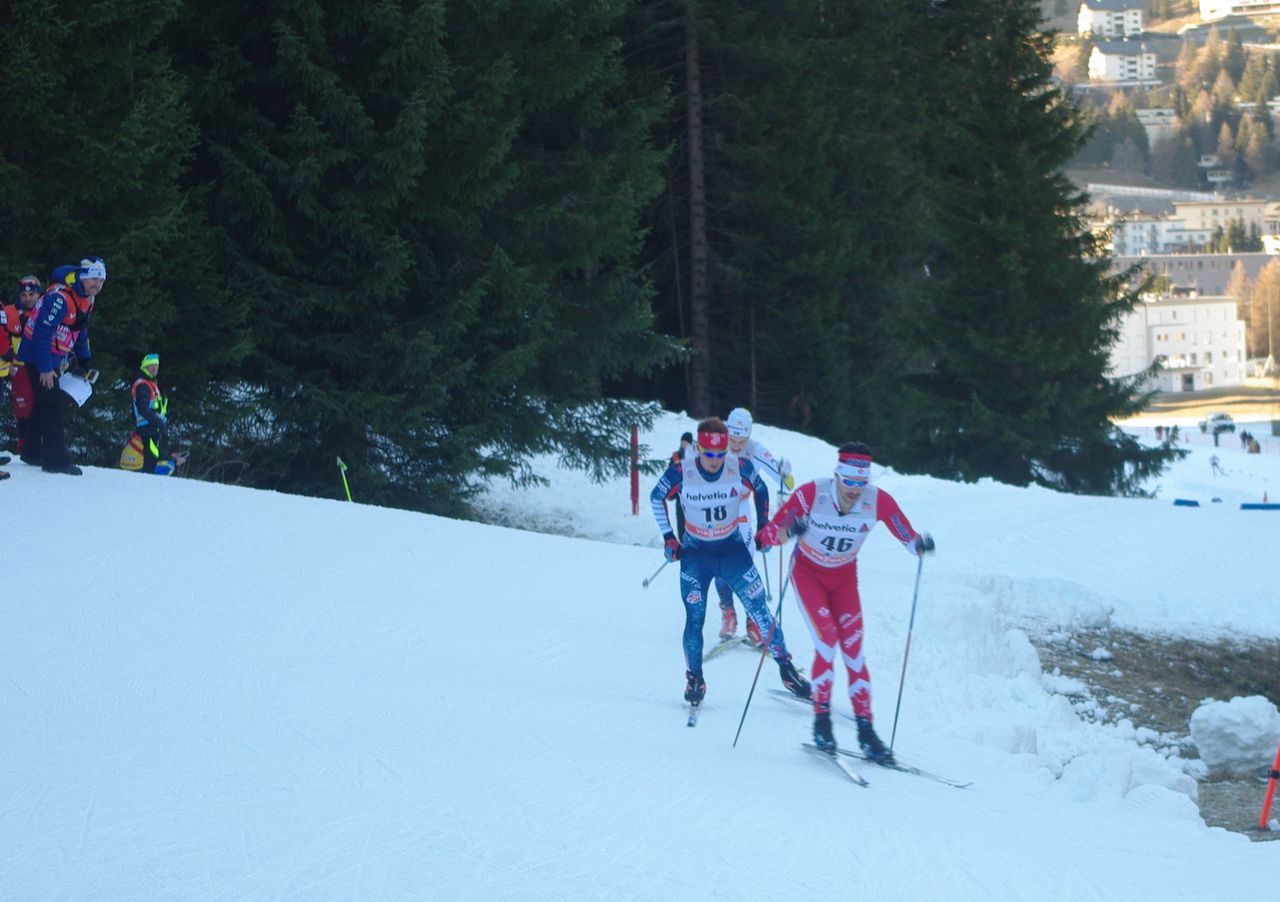
Skiing a steady race was Canada’s Alex Harvey, who ended up 12th, +1:29.4. It was his best distance result in Davos ever, despite contesting the event since 2009.
“I was confident coming in,” Harvey said. “And I was here before Kuusamo to try and get adapted a little bit to altitude, so yeah, I was feeling confident that I would have a better start, a better result than before. But you always have to deliver, so I’m happy that the feelings were representative of the result.”
He ended up skiing with Jens Burman of Sweden, who had a career-best result of sixth (+53.5).
“I towed him for a lap and a half, and his last lap he took over because he was pushing hard for the finish,” Harvey said. “He’s pretty new to the scene, so I didn’t know that much about him, but he ended up beating me actually. So we both helped each other. That was good.”
Teammate Graeme Killick made it two big improvements for Canada, clocking in 21st (+2:24.2). Killick was an early starter in bib 16, and when he lapped through for the first time, Sveen in bib seven was the only man who had gone faster.
“I was surprised that,” Killick said in a phone interview. “I generally don’t open that hard. I knew it was maybe going to maybe be a decent race… I didn’t think I taxed myself too much on the first lap. Then going into the stadium I saw Hellner was in the starting gate as I was lapping through. Probably twenty seconds to [ski up] to me. So I just tried to ski conservatively and be ready for that ride. He caught me just coming up towards the bunker at the top of the course.”
Hellner, who was on the podium in the 10 k skate in Lillehammer, wasn’t having his best day – he landed 13th, +1:34.4.
“I was hoping for a lot more than this,” he said after the race. “Before this I had the goal to be on the podium. The feeling was not so great, so I don’t know, it didn’t happen.”
Disappointed or not he was still one of the fastest men in the field, and Killick took advantage.
“I skied with him and I thought the race was okay, but I had a little bit of a blow-up on the next lap because he told me to lead,” Killick said. “He pulled over and so I led that section into the wind, and it wasn’t crazy long but it was kind of rough… when he surged by me and I tried to keep with him, I had a little blow-up there. I lost him slowly through that next lap and then I just tried to recover and ski a decent pace on my own there through the middle section.”
Like Harvey, Killick had set a best-ever result for the Davos race – his previous mark was 40th. And it was also the first time he had broken into the top 40 this World Cup season.
“It’s really encouraging for me,” he said. “I’ve never had my best races in Davos and I think it’s always been a course that I have potential with being at altitude, where I tend to do a little better. But a skate race is always difficult for me. It was really encouraging to prove to myself that I can ski that pace with those guys and even just having those initial splits, while I was skiing on my own, being pretty decent–that was really encouraging too going into the Tour de Ski and preparing for World Championships. I am super encouraged by the result.”
Other Canadian finishers were Devon Kershaw in 42rd (+3:52.9) and Andy Shields in 64th (+6:33.9).
The lone U.S. man even starting the race was Noah Hoffman, who finished one spot behind Kershaw in 44th (+3:58.9).
“My energy was actually pretty good,” Hoffman said. “I skied the race more or less the way I wanted to and I just wasn’t fast but ah, I don’t know I am left feeling optimistic still so I will take it. I am not sure why.
Hoffman actually skied with Harvey for a time, but wasn’t able to hang on to the ride.
“I had a perfect set up with Alex starting after I lapped through after one lap,” he said. “And I skied with him to the top of the course and then couldn’t hang on the down hill. I have struggled with the downhill before, and I’m frustrated by that. The uphill section–this is a unique course where it’s basically three and a half kilometers uphill, two and half kilometers downhill, and I’m always more competitive on the uphills, that is just the way I am built.”
— Jason Albert and Jake Ellis contributed reporting.
Chelsea Little
Chelsea Little is FasterSkier's Editor-At-Large. A former racer at Ford Sayre, Dartmouth College and the Craftsbury Green Racing Project, she is a PhD candidate in aquatic ecology in the @Altermatt_lab at Eawag, the Swiss Federal Institute of Aquatic Science and Technology in Zurich, Switzerland. You can follow her on twitter @ChelskiLittle.

